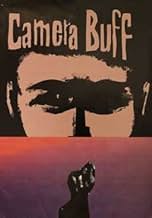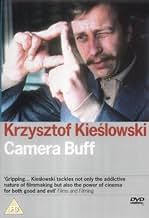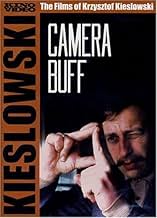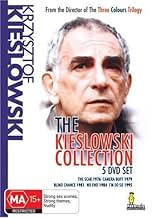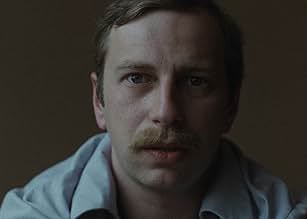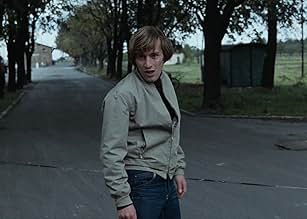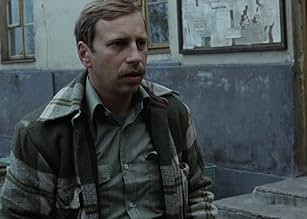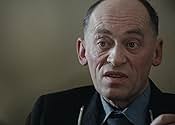NOTE IMDb
7,8/10
8,8 k
MA NOTE
Un simple ouvrier d'usine achète un appareil photo à l'occasion de la naissance de son enfant. Les autorités lui ordonnent de réaliser des documentaires sur le succès de l'usine.Un simple ouvrier d'usine achète un appareil photo à l'occasion de la naissance de son enfant. Les autorités lui ordonnent de réaliser des documentaires sur le succès de l'usine.Un simple ouvrier d'usine achète un appareil photo à l'occasion de la naissance de son enfant. Les autorités lui ordonnent de réaliser des documentaires sur le succès de l'usine.
- Réalisation
- Scénario
- Casting principal
- Récompenses
- 6 victoires au total
Avis à la une
I really liked this film because it dared to be different and it was an excellent study of psychology. This movie was about a Polish man who scraped together his money in order to by an 8mm camera to film his new baby. However, shortly after getting the camera and beginning filming his wife and child, he gets really hooked on making his little films--and seems to film almost everything around him. At first, it's fun, but then it becomes an obsession. In the process, instead of LIVING and EXPERIENCING life with his little family, he is filming them in a very detached way. However, he is so into the filming that he hardly recognizes his wife's growing anger over that ^&@#*^@! camera! Then, when his boss sees him filming and asks him to make a film for the company, his problem grows by leaps and bounds. He seems to see himself as the next great documentary maker and begins to enter competitions and send his films to the television network. To his wife's chagrin, he receives positive reviews and by this point she's lost him--they have no real life together. Where the film goes from there I will leave for you to watch. It is a fascinating psychological study of a man and his obsession--as well as the impact this ultimately has on others around him. An excellent film.
I found this film enthralling and revealing about a man gradually discovering his purpose in life and the effect it has on those around him as well as the obstacles he now has to face. He must now face the political as he takes a stance on social issues in his life and his town. His naiveté is warming and it demonstrates what a great actor Stuhr is that the film chips away at this slowly as he awakens to the new realities of his life. From a man who had everything at the beginning he has now shattered his domestic life but gained something some would say far richer and more permanent for his soul, a purpose. One that helps him to 'understand what this shitty life is about'. The final shot brings the film full circle as we see a man in the grip of his obsession.
Ah for the love of film
In 2006, I was one internet flight ticket transaction click away from moving to the area of Poland for the duration, but didn't. The "good" reason being is that I suffered some seriously grave trepidation over the fact that I would need to have two months salary in the bank before I'd EVER raise enough capital to buy an 8 mm motion picture camera. And this was in 2006. Sadly, these hypertensive concerns about finances low, all sleepless nights over equipment I don't have, and from where in the heck is the next camera going to come turned out to be relative in the scope of things in a sick and cyclical sense- and after interfacing with the characters of Kyrstof Kieslowski's incredibly moving Humanist Dark-Dramity, Camera Buff, for an hour and half, I'm just now harboring more than a few serious regrets about not actually abandoning the competitive, spiraling nightmare that is Western Life when I had the chance.
Camera Buff is a wonderful story about a factory worker Filip (Jerzy Stuhr); a man who, in his thirties, begins to see life anew through the view finder of a small gauge movie camera. Originally purchased for "two months salary," which "pissed his wife off" to document his newborn daughter's first few steps, the 8 mm camera is quickly realized as something more useful than just a device for making home-movies. The narrative's tension is organized specifically around the reaction to the films of the institutional power structures and forces around Filip that essentially commissioned, financed, and instigated the films themselves along with Filip's newly discovered and unyielding passion for creating them as he sees fit.
If you view the Kino Video DVD release of this film, perhaps even more profoundly affecting than the feature as an augury of hope for the human race is the sixteen minute black and white documentary entitled Talking Heads in which Kielowski conducts helter-skleter a multitude of fifteen second interviews about "who you are" and "what you want" with Polish citizens, age zero to one-hundred, across all walks of life starting at the year 1979 with a little gurgling baby. In all, it's wonderful material and has me seeking out more Kieslowski.
Camera Buff is a wonderful story about a factory worker Filip (Jerzy Stuhr); a man who, in his thirties, begins to see life anew through the view finder of a small gauge movie camera. Originally purchased for "two months salary," which "pissed his wife off" to document his newborn daughter's first few steps, the 8 mm camera is quickly realized as something more useful than just a device for making home-movies. The narrative's tension is organized specifically around the reaction to the films of the institutional power structures and forces around Filip that essentially commissioned, financed, and instigated the films themselves along with Filip's newly discovered and unyielding passion for creating them as he sees fit.
If you view the Kino Video DVD release of this film, perhaps even more profoundly affecting than the feature as an augury of hope for the human race is the sixteen minute black and white documentary entitled Talking Heads in which Kielowski conducts helter-skleter a multitude of fifteen second interviews about "who you are" and "what you want" with Polish citizens, age zero to one-hundred, across all walks of life starting at the year 1979 with a little gurgling baby. In all, it's wonderful material and has me seeking out more Kieslowski.
Krzyszof Kieslowksi begun his career as a documentary film-maker. From the start, he seemed to know two things: that in the shabby, feudal bureaucracy that was communist Poland, everything was political; and that the camera is never truly neutral. It was the second concern that saw him shift into telling fictional, constructed stories; while the first, and his own struggles as a young director, inspired the subject of 'Camera Buff', his first feature. As well as its immediate subject, the film is also a fascinating portrayal of an unfashionable subject, namely the class system, alive and well in the supposed socialist utopia (Kieslowski was a great admirer of Ken Loach, so perhaps we should not be too surprised). The film starts as a black comedy in the manner of the tenth part of his later 'Dekalog', and is both very funny and immediately true to life; as it progresses, it becomes more serious but there isn't quite the emotional intensity that marks his greatest works. The score is also less remarkable than those in the films he made with Zbigniew Priesner, his permanent collaborator from the mid 1980s. But his skill at composing images that are simultaneously profoundly ordinary and starkly arresting is very much in evidence, as is the characteristic sense of an all-pervasive greyness in the lives of his characters, punctured only by shafts of colour when his hapless hero comes into contact with the affluent metropolitan elite. In Dennis Potter's 'The Singing Detective', a central theme is the way that the artist will stop at nothing in using their own life as material, and this is also a theme here, growing in importance as the movie progresses. It's an unusual subject for a debut, and can perhaps be seen as Kieslowski laying his cards on the table before he begun the game. Greatness lay just around the corner.
An innocent enough decision. Filip (Jerzy Stuhr) buys a camera to film his new daughter. It costs two months salary and it makes him a celebrity of sorts as he is the only one in town that has one.
Now, his boss wants him to film the 25th anniversary celebration of the company. He really gets into filming and soon runs headlong into "rules." Of course, you have rules in a communist country. His wife is not too excited about his new hobby, but he soon gets his film entered into a film festival.
Soon, like all who truly love film, Filip is attending screenings, talking to directors, and reading film magazines to improve his craft. But, more and more his wife is displeased, and his boss is cooling to the idea as he moves from filming the company to social statements.
His desire for tranquility gives way to a desire for fame and art at the cost of his wife and family.
He also discovers the unintended consequences of reporting the truth. In the end he turns the camera on himself as he realizes he had everything in the beginning and lost it all.
A fascinating look at real cinema and finding what you want.
Now, his boss wants him to film the 25th anniversary celebration of the company. He really gets into filming and soon runs headlong into "rules." Of course, you have rules in a communist country. His wife is not too excited about his new hobby, but he soon gets his film entered into a film festival.
Soon, like all who truly love film, Filip is attending screenings, talking to directors, and reading film magazines to improve his craft. But, more and more his wife is displeased, and his boss is cooling to the idea as he moves from filming the company to social statements.
His desire for tranquility gives way to a desire for fame and art at the cost of his wife and family.
He also discovers the unintended consequences of reporting the truth. In the end he turns the camera on himself as he realizes he had everything in the beginning and lost it all.
A fascinating look at real cinema and finding what you want.
Le saviez-vous
- AnecdotesThe film's opening scene and Irka's nightmare about a hawk killing a chicken are reminiscent of Ken Loach's Kes (1969) -- a film about a boy who takes to training a wild kestrel in order to escape his troubled life. Later, Filip can be seen reading a filmmaking text and turning to a section about Ken Loach and Kes (1969). This reference is twofold. First, Filip is clearly inspired by filmmakers like Loach in making social realist films about working-class people. Second, Irka is tormented by images mirroring Kes (1969) which represent her husband's budding obsession with this type of filmmaking.
- Citations
Piotrek Krawczyk: [looking at a roll of motion picture film] It's beautiful what you guys do. A person's no longer alive, yet she's still here. It's beautiful.
- ConnexionsFeatured in Fejezetek a film történetéböl: A lengyel film (1990)
Meilleurs choix
Connectez-vous pour évaluer et suivre la liste de favoris afin de recevoir des recommandations personnalisées
- How long is Camera Buff?Alimenté par Alexa
Détails
Contribuer à cette page
Suggérer une modification ou ajouter du contenu manquant


